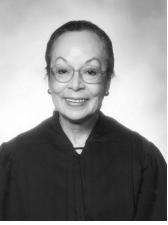Anna Diggs Taylor
| Anna Katherine Johnston Diggs Taylor | |
|---|---|
 | |
| Senior Judge of the United States District Court for the Eastern District of Michigan | |
|
Assumed office December 31, 1998 | |
| Judge of the United States District Court for the Eastern District of Michigan | |
|
In office November 2, 1979 – December 31, 1998 | |
| Appointed by | Jimmy Carter |
| Preceded by | Seat Created |
| Succeeded by | Marianne O. Battani |
| Personal details | |
| Born |
Anna Katherine Johnston 1932 (age 83–84) Washington, D.C., U.S. |
| Spouse(s) |
Charles Diggs (divorced, 1971) S. Martin Taylor (1976-present) |
| Alma mater |
Barnard College Yale Law School |
Anna Diggs Taylor (born Anna Katherine Johnston in Washington, D.C., December 9, 1932) is a United States District Judge for the United States District Court for the Eastern District of Michigan. She graduated from Barnard College in 1954 and Yale Law School in 1957, and worked in the Office of Solicitor for the United States Department of Labor. In 1979, she was appointed to the federal bench by President Jimmy Carter, becoming the first black woman judge appointed to the Eastern District of Michigan.
She became Chief Judge in 1997, and took senior status in 1998.[1]
In 1960, she married U.S. Representative Charles Diggs; they divorced in 1971. In 1976, she married S. Martin Taylor, a regent of the University of Michigan.
ACLU v. NSA
In 2006, Judge Taylor was the first federal judge to rule on the legal and constitutional issues of the NSA warrantless surveillance controversy. Her ruling, ACLU v. NSA, held that the domestic wiretapping conducted by the National Security Agency without court approval violates the Foreign Intelligence Surveillance Act and is unconstitutional. She granted a permanent injunction to halt it. The ruling, whose effect was stayed pending appellate proceedings,[2] sparked a vigorous political and legal controversy. She declined to rule on the legality of the alleged NSA call database, on state-secrets grounds. The quality and comprehensiveness of her opinion have been criticized by some legal experts.[3]
The conservative watchdog organization Judicial Watch has alleged that Taylor may have had a conflict of interest in the case, because, according to Judicial Watch she is or was secretary and trustee for the Community Foundation for Southeastern Michigan (CFSEM), a group that made a $45,000 grant over two years to the ACLU of Michigan, the plaintiff in ACLU v. NSA in whose favor Taylor ruled.[4]
Taylor's ruling was subsequently overturned by the U.S. Circuit Court of Appeals for the Sixth Circuit. By a 2-1 vote, the appellate court held that the plaintiffs lacked standing, and vacated the portion of Taylor's ruling concerning warrantless wiretaps.
Footnotes
- ↑ Biography at Detroit African-American History Project
- ↑ Associated Press (2006-10-05). "Court Allows Warrantless Wiretapping During Appeal". The Washington Post. Retrieved October 6, 2006.
- ↑ Adam Liptak (2006-08-19). "Experts Fault Reasoning in Surveillance Decision". The New York Times.
- ↑ "Judicial Watch press release". 2006-08-21.
References
External links
- Anna Diggs Taylor at the Biographical Directory of Federal Judges, a public domain publication of the Federal Judicial Center.

| Legal offices | ||
|---|---|---|
| Preceded by new seat |
Judge of the United States District Court for the Eastern District of Michigan 1979–1998 |
Succeeded by Marianne O. Battani |